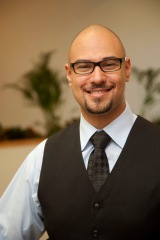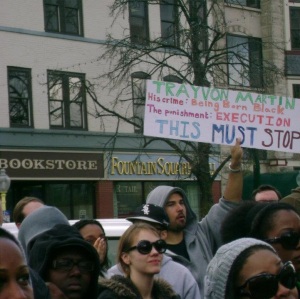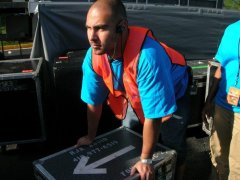Eric Anthony Grollman ’07, sociology and psychology, is a PhD candidate at Indiana University. He will begin teaching at the University of Richmond in August.
 Recently, I watched Dr. Freeman Hrabowski’s TED talk on the key initiatives needed to help all students to be successful. As usual, I was inspired by his passion, creative vision, and ideas. To share his message, I wrote about his talk in my blog, and reflected a little on my time at UMBC. “Wow,” I thought, “I hadn’t realized just how much UMBC set the stage for my career as a researcher, teacher, and advocate.”
Recently, I watched Dr. Freeman Hrabowski’s TED talk on the key initiatives needed to help all students to be successful. As usual, I was inspired by his passion, creative vision, and ideas. To share his message, I wrote about his talk in my blog, and reflected a little on my time at UMBC. “Wow,” I thought, “I hadn’t realized just how much UMBC set the stage for my career as a researcher, teacher, and advocate.”
At the start of college, I was an outspoken, know-it-all 18-year-old, struggling as a Meyerhoff Scholar. I was a math major, frustrated by what felt like a disconnect between my passion to make a difference in the world and calculus. I had immediately taken on a leadership position in the Freedom Alliance, the university’s group for lesbian, gay, bisexual, and transgender (LGBT) students. Thanks to some tough love from my parents and the Meyerhoff staff, I decided to “get it together,” which meant leaving the program to pursue a major in sociology. That was probably the hardest, yet best decision I have made in life thus far.
As I made this detour in my studies, I also became involved in the Student Events Board (SEB). Also, having made great connections at UMBC LeaderShape (UMBC’s student leadership retreat before STRiVE), I became one of the founders of the First Year Council. My college life improved tremendously because I was beginning to feel that my studies complemented my extracurricular activities well. I felt supported enough by my friends and advisors to do even more, to go beyond the existing formal groups and events.
With the support of students, staff, and faculty, I co-organized a group that advocated for more campus resources and services for LGBT students. Just imagine it: a junior, just 20 years old, calling together professors, staff from all over the campus, and other students to brainstorm how to create change on campus. And, the university (including Dr. Hrabowski) was responsive! But creating change is a slow, difficult process. At times, I learned hard lessons about navigating advocacy within an institution.
Things came to a bit of a standstill when a group of staff was selected to conduct a needs assessment for UMBC’s LGBT students. At the time, I felt this was essentially an attempt to stop our efforts, to show concern without actually changing anything. So, I turned my attention to finishing up school and applying to PhD programs. I decided to complete an honors thesis in sociology to impress graduate schools. When deciding on a topic for my thesis, I realized I could use it as an opportunity to continue my advocacy. With the guidance of Professors Fred Pincus and Ilsa Lottes, I chose to conduct a survey of UMBC students’ attitudes toward lesbians and gay men. What better way to supplement the appointed staff group’s needs assessment than to highlight whether prejudice existed on campus?
 These and subsequent experiences have demonstrated to me the importance of tying together efforts across each aspect of your life. Rather than feeling I should give up on advocacy and pursue research instead, I decided to conduct research as well. I presented my thesis at Undergraduate Research and Creative Achievement Day (URCAD) in 2007, and published it in the UMBC Review: Journal of Undergraduate Research the following year. My advisor, Ilsa Lottes, continued to work with me after I graduated, helping to turn the thesis into a publication at the International Journal of Sexual Health. I helped to shed light on campus life for LGBT students and advanced research on homophobia. Now, because of the seeds I planted at UMBC, I am not deterred when I sometimes face resistance to my advocacy. I draw strength and motivation from the synergistic relationships among my research, teaching, and advocacy. And it turns out that my research relies heavily on quantitative methods and statistics, so I never actually made a “detour” from math!
These and subsequent experiences have demonstrated to me the importance of tying together efforts across each aspect of your life. Rather than feeling I should give up on advocacy and pursue research instead, I decided to conduct research as well. I presented my thesis at Undergraduate Research and Creative Achievement Day (URCAD) in 2007, and published it in the UMBC Review: Journal of Undergraduate Research the following year. My advisor, Ilsa Lottes, continued to work with me after I graduated, helping to turn the thesis into a publication at the International Journal of Sexual Health. I helped to shed light on campus life for LGBT students and advanced research on homophobia. Now, because of the seeds I planted at UMBC, I am not deterred when I sometimes face resistance to my advocacy. I draw strength and motivation from the synergistic relationships among my research, teaching, and advocacy. And it turns out that my research relies heavily on quantitative methods and statistics, so I never actually made a “detour” from math!
And, I am not the only one who has grown over the years. I am so proud to see that UMBC’s commitment to community engagement and creating well-rounded leaders of tomorrow has expanded further since I graduated. BreakingGround is a perfect model: bringing together students, staff, and faculty; emphasizing diversity; and maximizing the synergy from advocacy in service, teaching, and research. I cannot wait to see what (and who) else grows from the seeds being planted each day at UMBC!
Contact the author, Eric Anthony Grollman, at egrollma@indiana.edu.


Thank you so much for sharing your story! It’s well-received and appreciated.